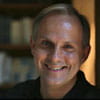 A couple of weeks ago I preached at my home base, St. David's Episcopal, Austin, from Matthew 2: 1-12, the gospel reading about the Magi from the East, Bad King Herod who lost his mind over the thought of a new king, and that wondrous star that led people straight to Jesus' house. The text is rich with possibilities, but one of the honorable homiletical turns a preacher could take is to look at King Herod, desperate not to be forced from his throne, and to ask, along with our evangelical brethren and sistren, Who or what is on the throne of your heart?
A couple of weeks ago I preached at my home base, St. David's Episcopal, Austin, from Matthew 2: 1-12, the gospel reading about the Magi from the East, Bad King Herod who lost his mind over the thought of a new king, and that wondrous star that led people straight to Jesus' house. The text is rich with possibilities, but one of the honorable homiletical turns a preacher could take is to look at King Herod, desperate not to be forced from his throne, and to ask, along with our evangelical brethren and sistren, Who or what is on the throne of your heart?
Because, setting aside any question of a life after this one, the truth is that whoever is on the throne of your heart, whether that's you, Jesus, or Mammon, is going to dictate who you are and what you do in this life.
Scott Bader-Saye, the ethicist at the Seminary of the Southwest, has also come to talk about such things at St. David's recently. For Scott, who wrote Following Jesus in a Culture of Fear, the central question is still about who or what is enthroned in our lives, but he asks the question as an ethicist might: What, he bids us consider, have we chosen as our highest good?
As with the throne metaphor, our lives will be shaped around what we consider our highest good; we will do everything in our power to seek this highest good, even if it turns out to be unattainable, or not really all that good a good.
Know your highest good, and you will know, in a very real sense, who you are.
In times past, the highest good for Christians was assumed to be love of and knowledge of God, as Augustine described happiness, or friendship with God, as Thomas Aquinas put it, or "to love God and enjoy Him forever," as the Westminster Catechism would have it. But in today's culture, as Scott points out, many Christians echo a desire for the highest good of our culture, which seems to be security.
If your highest good is to love and serve God, you will orient your life in one way. But if your highest goal is security—that is, not to be so afraid, and to feel as though you somehow possess some control in a chaotic world—then it will be a very different matter.
For the next few weeks, beginning now, I want to peel back some of our underlying assumptions about who we are and what matters to us as Christians and Americans, to ask hard questions about why we do the things we do and believe the things we say we believe. We'll be looking at some of the things that Wayne Baker, over at the Our Values project, calls Core Values, things that are strongly and widely held to be the beliefs that are at the core of our society.
As we try to do here every week, I want to determine in what ways our political values and our faith commitments are running parallel to each other, as they should, or diverging wildly from each other, as, I fear, is sometimes the case. I want to start here, this week, with Scott Bader-Saye's question: What is your highest good?
(If you aren't, by the way, sure what your highest good is, that seems to be an important thing to discover. If you haven't chosen consciously, you may nonetheless have jumped off a cliff alongside everyone around you, just like your mom always feared.)
And I also want to begin with Scott's work on our culture of fear. In the 9/11 attacks, as no one needs to be reminded, we became victims of the violence many other nations have suffered before us. But being Americans, we have been lucky, blessed, however you want to describe it. Protected by a military budget larger than the next dozen nations combined, and by two vast lovely oceans, we thought that the attacks of the Tamil Tigers or the IRA or whoever is the terrorist group du jour only ever happened to someone else.
It is easy for us to be all stiff upper lip when problems are happening to someone else, but it is a very different thing when it happens to us. However you may feel about the War on Terror, honesty compels us to admit that after 9/11, we as a nation contracted.
We attacked.
We reacted with fear, suspicion, and alarm.
To protect ourselves, we have sent the men and women of our armed forces to kill and to die.
To protect ourselves, we have accepted limitations on our civil rights, decided that our privacy was less important than our desire to feel safer.





